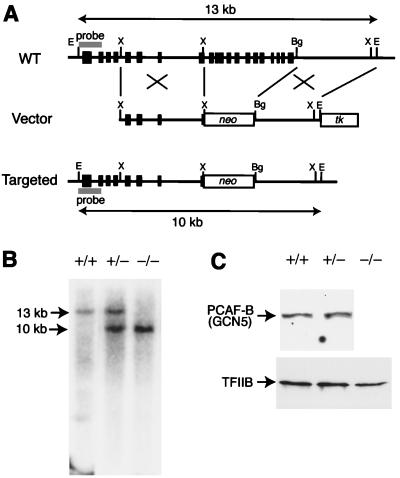Figure 2.
Targeted disruption of the PCAF-B/GCN5 locus. (A) Targeting strategy for PCAF-B/GCN5 gene. The configuration of the wild-type (WT) allele is shown (Top). The genomic region containing exons encoding the 3′ terminus of PCAF-B/GCN5 (shown by boxes) was replaced by a neomycin resistance gene cassette in the targeting vector (Middle), yielding the targeted allele (Bottom) by homologous recombination. Restriction sites: Bg, BglII; E, EcoRI; X, XhoI. (B) Southern blot of EcoRI-digested genomic DNAs isolated from offspring of heterozygous mice. The probe hybridizes with 13- and 10-kb fragments in the wild-type and targeted allele, respectively. (C) Immunoblot of protein extracts from PCAF-B/GCN5+/+, PCAF-B+/−, and PCAF-B−/− embryos. PCAF-B/GCN5 could not be detected in PCAF-B−/− embryos (Upper). Note that an immunoreactive band around 55 kDa could not be detected. Further characterization would be required to resolve the issue of the N-terminally truncated form of mouse PCAF-B/GCN5. As an internal control, TFIIB was also detected (Lower).

